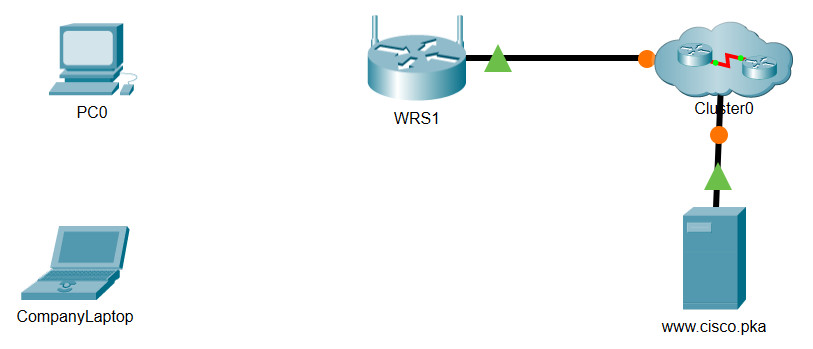8.1.2.11 Packet Tracer – Connect to a Wireless Router and Configure Basic Settings (Answers)
Topology

Objectives
- Configure a PC to join a wireless network.
- Test the wireless connection.
Introduction
In this activity, you will configure a wireless router to accept CompanyLaptop as a wireless client and route its IP packets.
Step 1: Prepare the Network.
a. Select Connections, represented by a lightning bolt, from the bottom-left side of Packet Tracer.
b. Click Copper Straight-Through, represented by a solid black line.
c. When the cursor changes to connection mode, click PC0 and choose FastEthernet0. Click WRS1 and choose Ethernet 1 to connect the other end of the cable.
Notice that WRS1 has 2 network segments: internal and internet. Ports Ethernet 1-4 and Wireless are considered part of the internal segment while the Internet port is part of the Internet. WRS1 will act as a switch to the devices connected to its internal segment and as a router between the two segments. PC0 is now connected to the internal segment (Ethernet 1). When Packet Tracer displays green dots on both sides of the connection between PC0 and WRS1, continue to the next step.
Note: If no green dots are shown, make sure to enable Show Link Lights under Options > Preferences. You may also click Fast Forward Time just above the Connections selection box in the yellow bar.
Step 2: Configure PC0 to use DHCP.
To reach the WRS1 management page, PC0 must communicate on the network. A wireless router usually includes a DHCP server, and the DHCP server is usually enabled by default on the internal segment of the router. For PC0 to acquire an IP address from the WRS1, PC0 will receive the IP information from the DHCP server on WRS1.
a. Click PC0, and select the Desktop tab.
b. Click IP Configuration and select DHCP.
What is the IP address of the computer?
192.168.0.100
What is the subnet mask of the computer?
255.255.255.0
What is the default gateway of the computer?
192.168.0.1
Close the IP Configuration window.
Note: Values can vary within the network range due to normal DHCP operation.
Step 3: Connect to the Wireless Router.
a. In the Desktop tab on PC0, choose Web Browser.
b. Enter 192.168.0.1 in the URL field to open the web configuration page of the wireless router.
c. Use admin for both the username and password.
d. Under the Network Setup heading on the Basic Setup page, notice the IP address range for the DHCP server. Is the IP address for PC0 within this range? Is it expected? Explain your answer.
Yes. PC0 has 192.168.0.100/24 which belongs to 192.168.0.0/24 and in the range of 192.168.0.100 to 192.168.0.149. It is expected because PC0 acquired its IP information from WRS1 via DHCP.
Step 4: Configure the Internet Port of WSR1
In this step, WRS1 is configured to route the packets from the wireless clients to other networks. You will configure the Internet port on WRS1 to connect to other networks.
a. Under the Internet Setup at the top of the Basic Setup page, change the Internet IP address method from Automatic Configuration – DHCP to Static IP.
b. Type the IP address to be assigned to the Internet interface as follows:
Internet IP Address: ……………………….. 209.165.200.225
Subnet Mask: …………………………………. 255.255.255.252
Default Gateway: ……………………………. 209.165.200.226
Leave the rest unchanged.
c. Scroll down the page and click Save Settings.
d. Click Continue and move on to the next step.
Step 5: Configure the WSR1 SSID
a. Navigate to Wireless > Basic Wireless Settings.
b. Change Network Name (SSID) to aCompany. Notice that SSIDs are case-sensitive.
c. Scroll to the bottom of the window and click Save Settings.
d. Laptop0 now shows a wireless connection to WRS1.
e. Click Continue and move on to the next step.
Step 6: Change the WRS1 Access Password
a. Navigate to Administration > Management and change the current Router password to cisco.
b. Scroll to the bottom of the window and click Save Settings.
c. Use the username admin and the new password cisco when prompted to log in to the wireless router.
d. Click Continue and move on to the next step.
Step 7: Change the DHCP address range in WRS1
In this step, you will change the internal network address from 192.168.0.0/24 to 192.168.50.0/24. When the internal network address changes, the IP addresses on the devices in the internal network must be renewed to receive new IP addresses before the lease is timed out.
a. Navigate to Setup > Basic Setup.
b. Scroll down the page to Network Setup.
c. The IP address assigned to Router IP is 192.168.0.1. Change it to 192.168.50.1.
d. Scroll to the bottom of the window and click Save Settings.
e. Note that the DHCP range of addresses has been automatically updated to reflect the interface IP address change. The Web Browser will display a Request Timeout after a short time. Why?
Because the PC0 IP address is no longer within the same network as the router. The IP address of PC0 is outside the new range of the DHCP server.
f. Close the PC0 web browser.
g. In PC0 Desktop tab, click the Command Prompt.
h. Type ipconfig /renew to force PC0 re-acquire its IP information via DHCP.
What is the new IP address information for PC0?
IP Address:……………………….. 192.168.50.100 Subnet Mask:……………………. 255.255.255.0 Default Gateway:………………. 192.168.50.1 DNS Server:……………………… 209.165.201.1
i. Check your score, you should have 100%.
